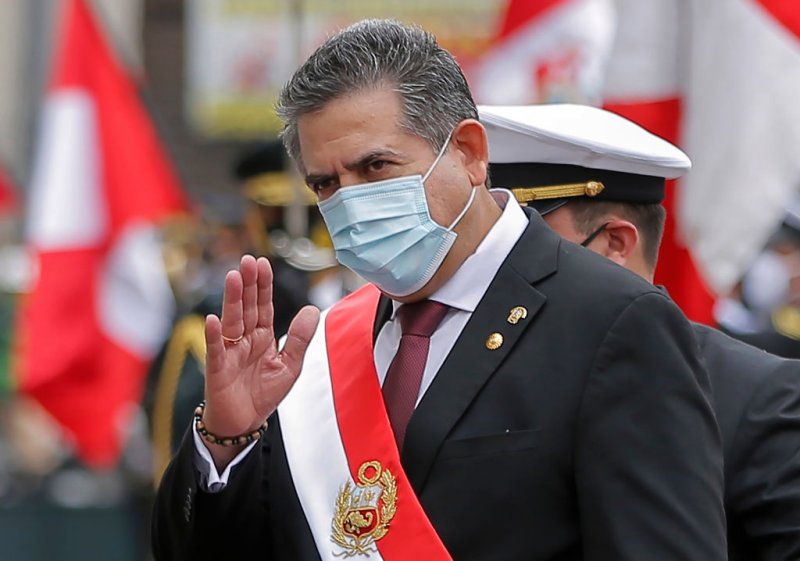Lima, 15 November (Argus) — Peru’s interim president Manuel Merino resigned today just five days after assuming office, deepening the copper and LNG-exporting country’s constitutional crisis.
The 130-member unicameral congress will now pick a new president, the third in a week.
Merino took over the presidency on 10 November after the congress, which he headed, impeached popular former president Martín Vizcarra on disputed allegations of corruption.

The head of the Peruvian Congress, Manuel Merino, waves after being sworn in as interim President in Lima on November 10, 2020 day after the Congress voted to impeach and oust President Martin Vizcarra over corruption allegations. – Merino, 59, was sworn in at a special session of Congress on Tuesday, becoming Peru’s third president since 2016, reflecting the institutional fragility which has characterized the South American country. Under the constitution, he will take over the presidential functions until the end of the current term in July 2021. (Photo by Luka GONZALES / AFP) (Photo by LUKA GONZALES/AFP via Getty Images)
Merino’s successor could be chosen from among the 19 lawmakers who voted against Vizcarra’s impeachment on 9 November. In a sign of popular pressure, several political parties that backed the impeachment now say they will not support a candidate who voted for Vizcarra’s removal.
Another possibility would see Vizcarra’s reinstatement by Peru’s constitutional court, but the legality of such a move is not clear.
“A little dictator has left the (presidential) palace,” Vizcarra said today as lawmakers met to determine who would lead the country.
Whoever is chosen as Peru’s next president will serve out the remainder of Vizcarra’s term, which ends in July 2021. Peruvians are already scheduled to choose a new president from among 23 parties in April 2021 general elections. Under Peruvian election law, Vizcarra is ineligible to run, and none of the 130 lawmakers can seek re-election.
Merino was forced to resign following a night of violent clashes between security forces and protesters who saw the impeachment as a congressional power grab.
At least two people were killed and more than 100 injured by police officers in a protest march in Lima overnight.
The political parties that had supported Merino, as well as the powerful business umbrella group, Confiep, demanded his resignation.
The upheaval will make it even harder for Peru to claw out of the severe economic malaise brought on by the Covid-19 pandemic and a sharp market downturn for the commodities on which the Peruvian economy depends.
The association of mining and hydrocarbon companies reported no operational disruptions, and essential services, such as maritime ports, were functioning normally today. But Lima’s international airport was closed yesterday as a security precaution.
Merino’s cabinet including veteran energy and mines minister Carlos Herrera stepped down hours before he did, and many second-tier authorities, including deputy ministers and agency chiefs, resigned as the violent clashes between protesters, mainly students, and police raged in the streets.
Neighboring countries such as Chile, which has substantial investment in Peru, are closely monitoring the political crisis. In Bolivia, another controversial interim presidency just ended with the recent inauguration of president Luis Arce.

